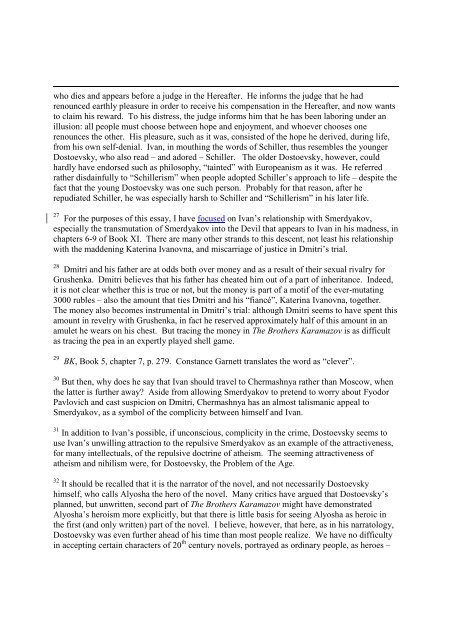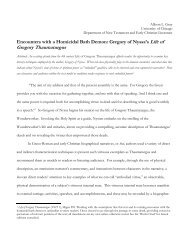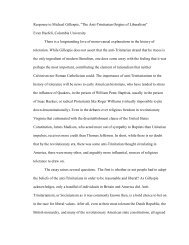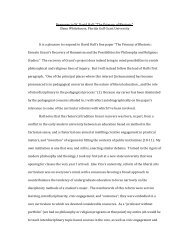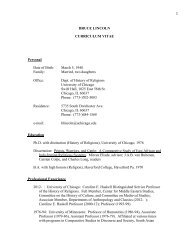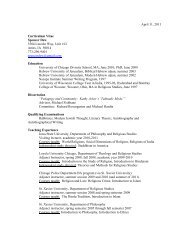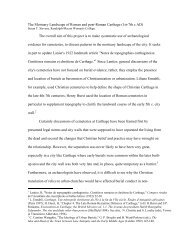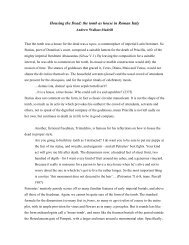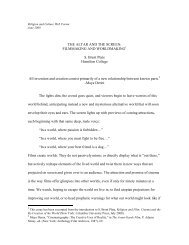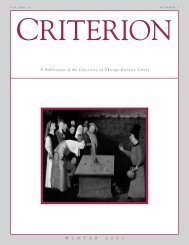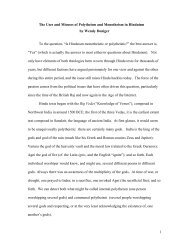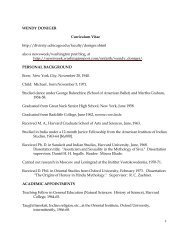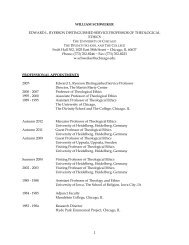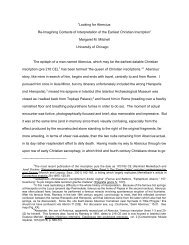The Reification of Evil and The Failure of Theodicy: The Devil in ...
The Reification of Evil and The Failure of Theodicy: The Devil in ...
The Reification of Evil and The Failure of Theodicy: The Devil in ...
Create successful ePaper yourself
Turn your PDF publications into a flip-book with our unique Google optimized e-Paper software.
who dies <strong>and</strong> appears before a judge <strong>in</strong> the Hereafter. He <strong>in</strong>forms the judge that he had<br />
renounced earthly pleasure <strong>in</strong> order to receive his compensation <strong>in</strong> the Hereafter, <strong>and</strong> now wants<br />
to claim his reward. To his distress, the judge <strong>in</strong>forms him that he has been labor<strong>in</strong>g under an<br />
illusion: all people must choose between hope <strong>and</strong> enjoyment, <strong>and</strong> whoever chooses one<br />
renounces the other. His pleasure, such as it was, consisted <strong>of</strong> the hope he derived, dur<strong>in</strong>g life,<br />
from his own self-denial. Ivan, <strong>in</strong> mouth<strong>in</strong>g the words <strong>of</strong> Schiller, thus resembles the younger<br />
Dostoevsky, who also read – <strong>and</strong> adored – Schiller. <strong>The</strong> older Dostoevsky, however, could<br />
hardly have endorsed such as philosophy, “ta<strong>in</strong>ted” with Europeanism as it was. He referred<br />
rather disda<strong>in</strong>fully to “Schillerism” when people adopted Schiller’s approach to life – despite the<br />
fact that the young Dostoevsky was one such person. Probably for that reason, after he<br />
repudiated Schiller, he was especially harsh to Schiller <strong>and</strong> “Schillerism” <strong>in</strong> his later life.<br />
27 For the purposes <strong>of</strong> this essay, I have focused on Ivan’s relationship with Smerdyakov,<br />
especially the transmutation <strong>of</strong> Smerdyakov <strong>in</strong>to the <strong>Devil</strong> that appears to Ivan <strong>in</strong> his madness, <strong>in</strong><br />
chapters 6-9 <strong>of</strong> Book XI. <strong>The</strong>re are many other str<strong>and</strong>s to this descent, not least his relationship<br />
with the madden<strong>in</strong>g Kater<strong>in</strong>a Ivanovna, <strong>and</strong> miscarriage <strong>of</strong> justice <strong>in</strong> Dmitri’s trial.<br />
28 Dmitri <strong>and</strong> his father are at odds both over money <strong>and</strong> as a result <strong>of</strong> their sexual rivalry for<br />
Grushenka. Dmitri believes that his father has cheated him out <strong>of</strong> a part <strong>of</strong> <strong>in</strong>heritance. Indeed,<br />
it is not clear whether this is true or not, but the money is part <strong>of</strong> a motif <strong>of</strong> the ever-mutat<strong>in</strong>g<br />
3000 rubles – also the amount that ties Dmitri <strong>and</strong> his “fiancé”, Kater<strong>in</strong>a Ivanovna, together.<br />
<strong>The</strong> money also becomes <strong>in</strong>strumental <strong>in</strong> Dmitri’s trial: although Dmitri seems to have spent this<br />
amount <strong>in</strong> revelry with Grushenka, <strong>in</strong> fact he reserved approximately half <strong>of</strong> this amount <strong>in</strong> an<br />
amulet he wears on his chest. But trac<strong>in</strong>g the money <strong>in</strong> <strong>The</strong> Brothers Karamazov is as difficult<br />
as trac<strong>in</strong>g the pea <strong>in</strong> an expertly played shell game.<br />
29 BK, Book 5, chapter 7, p. 279. Constance Garnett translates the word as “clever”.<br />
30 But then, why does he say that Ivan should travel to Chermashnya rather than Moscow, when<br />
the latter is further away? Aside from allow<strong>in</strong>g Smerdyakov to pretend to worry about Fyodor<br />
Pavlovich <strong>and</strong> cast suspicion on Dmitri, Chermashnya has an almost talismanic appeal to<br />
Smerdyakov, as a symbol <strong>of</strong> the complicity between himself <strong>and</strong> Ivan.<br />
31 In addition to Ivan’s possible, if unconscious, complicity <strong>in</strong> the crime, Dostoevsky seems to<br />
use Ivan’s unwill<strong>in</strong>g attraction to the repulsive Smerdyakov as an example <strong>of</strong> the attractiveness,<br />
for many <strong>in</strong>tellectuals, <strong>of</strong> the repulsive doctr<strong>in</strong>e <strong>of</strong> atheism. <strong>The</strong> seem<strong>in</strong>g attractiveness <strong>of</strong><br />
atheism <strong>and</strong> nihilism were, for Dostoevsky, the Problem <strong>of</strong> the Age.<br />
32 It should be recalled that it is the narrator <strong>of</strong> the novel, <strong>and</strong> not necessarily Dostoevsky<br />
himself, who calls Alyosha the hero <strong>of</strong> the novel. Many critics have argued that Dostoevsky’s<br />
planned, but unwritten, second part <strong>of</strong> <strong>The</strong> Brothers Karamazov might have demonstrated<br />
Alyosha’s heroism more explicitly, but that there is little basis for see<strong>in</strong>g Alyosha as heroic <strong>in</strong><br />
the first (<strong>and</strong> only written) part <strong>of</strong> the novel. I believe, however, that here, as <strong>in</strong> his narratology,<br />
Dostoevsky was even further ahead <strong>of</strong> his time than most people realize. We have no difficulty<br />
<strong>in</strong> accept<strong>in</strong>g certa<strong>in</strong> characters <strong>of</strong> 20 th century novels, portrayed as ord<strong>in</strong>ary people, as heroes –


